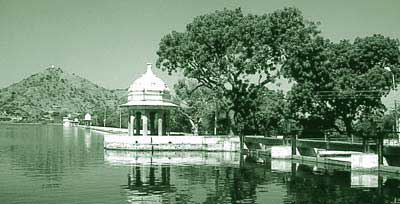|
The year: 1982. Balwant Singh Mehta a citizen of Udaipur, approached the Rajasthan High Court to control pollution in the lakes of Udaipur, for the simple reason that he was not getting clean water to drink. Mehta turns 101 this year. The polluted lakes of Udaipur, may get a fresh lease of life. Relief came in the form of a judgement from the courts, thanks to the interest shown by the two judges of the Rajasthan High Court, Jodhpur, Justice DN Joshi and Justice N N Mathur. At the end of their tether and looking for action by which all the 600 mm-odd rainfall that falls over Udaipur can be captured, the Jheel Sanrakshan Samiti (JSS), a Udaipur-based non government organisation petitioned the courts. The courts have acted. In no uncertain terms, the courts have hauled up the concerned government officials, warning them with dire consequences if they continue to fail in their duties. A time-bound action plan to clean up the lakes has been prepared at the court’s behest. The court has directed that these lakes be desilted before the onset of the monsoon this year. Thanks to their decision, the rainfall may just be captured this monsoon itself, rejuvenating lakes and recharging depleting groundwater levels. Udaipur lakes, to which the city owes its identity, are in a pitiable condition. In existence for the last 600-700 years, the beautiful lakes are now turning into cesspools of filth because of the heaps of wastes and garbage dumped into them, uncontrolled growth of water hyacinth and heavy siltation. 60 per cent of the lakes have dried up. With the lakes having dried up, groundwater levels have declined. Used for drinking purposes, so bad is the pollution in the water from Swaroop sagar, that the filtration plant just cannot deal with the load. The filters get clogged.
Witness to the destruction of these lakes, citizens of Udaipur from diverse walks of life took it upon themselves to save the lakes and its environment by constituting JSS. JSS was formed with a commitment to arrest and reverse the fast deterioration of the Udaipur lake system. The idea for JSS was put forward by Anant Ganesh Trivedi, a social activist, in 1992, at a meeting for World Envronment Day on June 5, and mooted by everyone present at the meeting, including the district commissioner, heads of the departments of irrigation, public health and engineering department (PHED) and Urban Improvement Trust (UIT). The JSS comprises concerned citizens from all walks of life, some active in their professional field and many retirees, including noted freedom fighter Balwant Singh Mehta. The people of Udaipur have always been actively participating in programmes to clean up the lakes since 1969. In 1980, for instance, citizens working like a conveyor belt removed water hyacinth which had totally covered two lakes. Ever since the JSS was formed, this participation was given a formal platform and participation increased. Unfortunately, no permanent solution was reached in spite of all efforts. Siltation of the lakes continued, the water capacity of the lakes reduced, and pollution was as high as before. For the JSS, involved in cleaning up these lakes since 1992, the court order is a shot in the arm. "The situation is alarming in Udaipur, if we don’t capture the rains, there could be drought in Udaipur," fears Tej Razdan, a surgeon by profession and an activist by choice. Razdan is secretary of the JSS. Though petitions have been doing the rounds in the courts for several years now the courts had been hoodwinked by the government into believing that remedial action had been taken. It took a fresh petition in 1997 that finally informed the courts that the situation had only deteriorated. The Double Bench of Justice NN Mathur and Justice DN Joshi are taking the case seriously and have heard it on a fortnightly, even weekly basis. For expediting the execution of the action plan, the court has directed that task forces that include citizens and NGOs be constituted. The court was explicit in its directions, leaving nothing to chance. The chief secretary was held responsible for implementation. Any department or ministry showing inaction should be reported to the court so that appropriate action could be taken. The court directed the divisional commissioner to be present in person to before the court for the next hearing, along with a time bound plan of action as well as all the relevant information. Taking note that the lakes of Udaipur had been identified for conservation under the National Lake Conservation Plan of the government of India, the court directed that the secretary, ministry of environment and forests, be impleaded as respondent. All stakeholders in Udaipur: the government, citizens, the industry are chipping in to ensure that the rains are captured this monsoon. Desilting is now proceeding full steam ahead. Does your city face a problem with its urban water bodies? Share your experiences with us. For more information on the JSS contact Dr Tej Razdan, Honorary Secretary, Jheel Sanrakshan Samiti, 113 Chetak Marg, Udaipur 313 001. Ph: 0294 523 715, fax: 0294 523809. |

